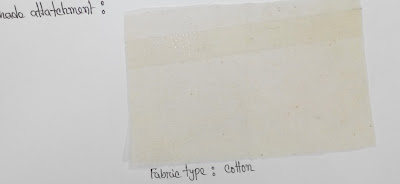Theory: After scouring and bleaching the cellulosic goods
(usually knit fabric) are treated with acetic acid for neutralization hen the
fabric is treated with a suitable enzyme within a recommended condition (temp,
time, pH etc) for polishing the fabric surface by removing the short
and immature fibre from the substrate. This process can be applied before or
after dyeing (normally before dyeing ) operation.
Recipe:
Enzyme -4 g/l
CH3COOH – 1 g/l
Wetting agent -1 g/l
Sequestering agent -1 g/l
Temp – 55°C
Time – 50 min
M: L -1:40
PH -4.5
Fabric weight -5 g
Enzyme killing:
Temperature - 80° C
Time -10 min
Function of the chemical required:
Wetting agent: It accelerates the wetability of material in
solution thus helps to easy penetration of chemical into substrate. Usually it
is used in scouring, bleaching & dyeing process. It is available in market
in form of clear of yellowish liquid.
Sequestering agent: Sequestering agent is used to treating
the hard water and removing the metallic in the solution.
Recipe calculation:
Enzyme,
For 1000cc water, enzyme required 4 gm
1 “ “ “ “ 4/1000 “
200 cc “ “ “ “ (4×200)/1000 “ = 0.8 gm
Similarity,
CH3COOH = 0.2 g
Wetting agent = 0.2 g
Seq agent = 0.2 g
Water = 200cc
 |
| Add caption |
Shade attatchement:
 |
| cotton fabric |
Conclusion: In enzyme treatment on cotton fabric, the temp
and time are very important parameter properly. Otherwise bacteria will be
killed before treatment.
No comments:
Post a Comment